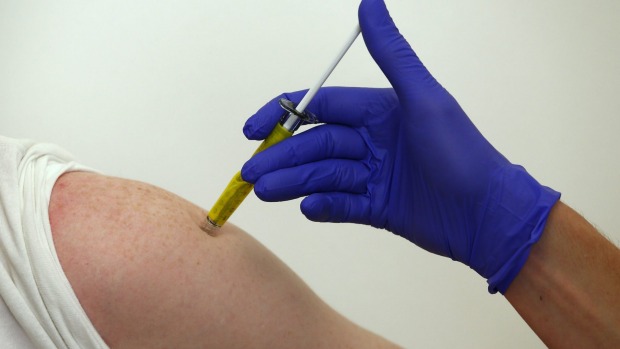
A new shingles vaccine has been developed with the help of Australian scientists.
The body’s immune system is a bit like an army. When invading viruses or bacteria attack, soldiers within the immune system are mobilised depending on their expertise.
To protect the body from the shingles virus, scientists have designed a new vaccine that stimulates specific kinds of immune cell soldiers – ones that weaken with age.
By employing this strategy, they have created a vaccine that is 97 per cent effective in adults aged 50 to 70 years old, the main group affected by the shingles virus.
“We didn’t expect that degree of efficacy,” said Tony Cunningham, one of the scientists involved in the vaccine and the chief scientist at the Westmead Millennium Institute for Medical Research.
To compare, the world’s first shingles vaccine Zostavax? only offers protection to about 50 per cent of the population.
In the New England Journal of Medicine the team report that only six out of 7698 patients given the new vaccine became infected with shingles over a three-year period compared to more than 200 people in a similar-sized control group who were not given the vaccine.
Shingles, a skin rash that causes painful blisters around the body, is caused by the same virus responsible for chickenpox, which 95 per cent of people get before they’re adults.
“The virus circulates the blood and infects little clusters of the nerve cells next to your spinal cord,” said Professor Cunningham.
There it waits, held under guard by the immune system, until its is reactivated, an event more likely to occur in people over 50 because part of their body’s immune system weakens with age. In addition to the rash about 50 per cent of people develop painful complications that can last for months.
Professor Cunningham said the new vaccine, developed by pharmaceutical company GlaxoSmithKline?, works by stimulating that part of the immune system.
The body has two types of immunity: protein antibodies and white blood cells known as T cells.
“You need antibodies to block the virus when its circulating around the body and block it getting into cells, and when it does get into cells you need T cells to try and kill those virus-infected cells,” said Professor Cunningham.
When people reach their 50s and 60s, T cell immunity wanes, allowing shingles to strike.
“You need something that’s directed specifically at T cell immunity,” he said.
The vaccine now needs approval from regulatory bodies before it becomes available for patients.
“It’s the first big success for this type of strategy,” said Professor Cunningham, who was a consultant to GlaxoSmithKline?.
